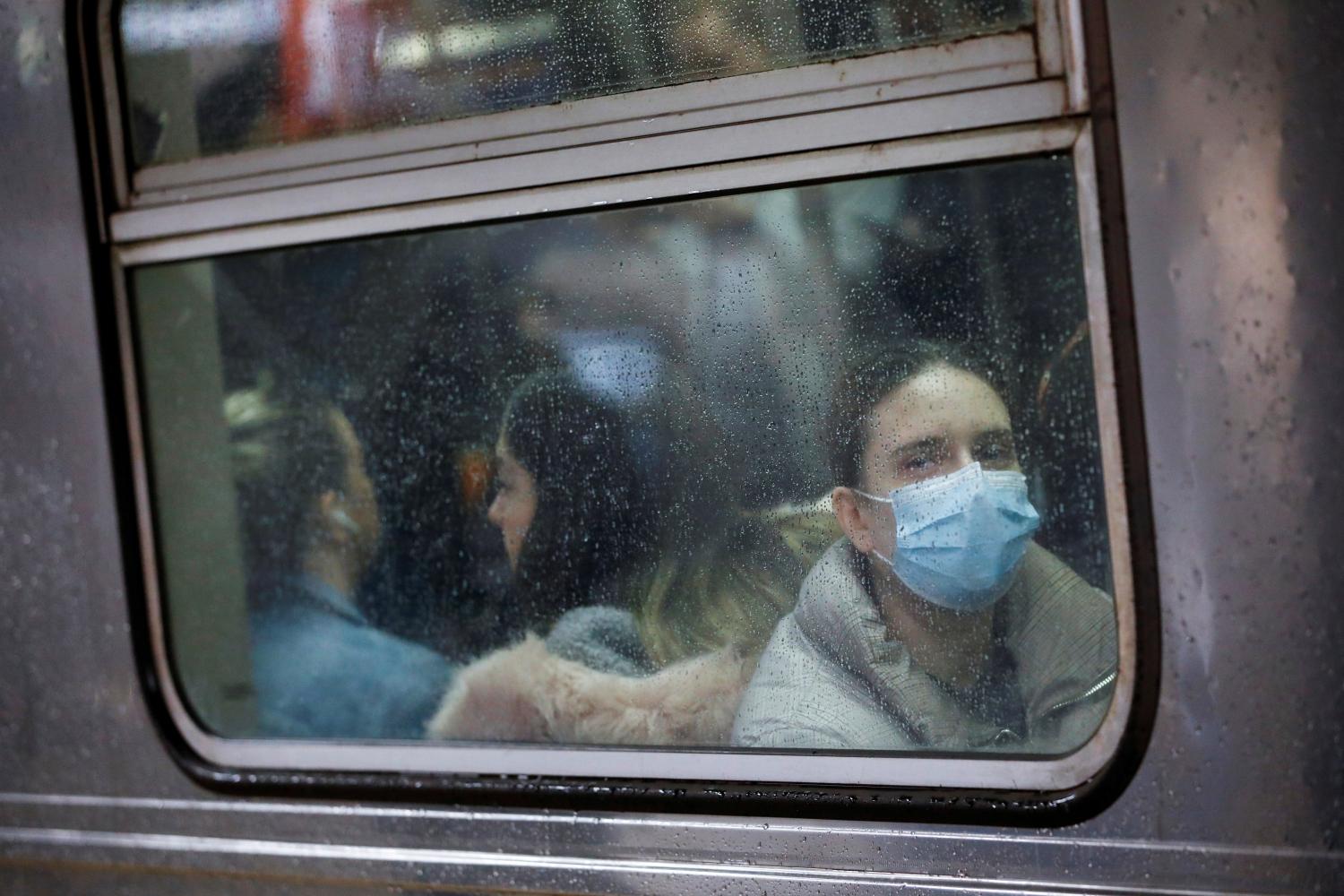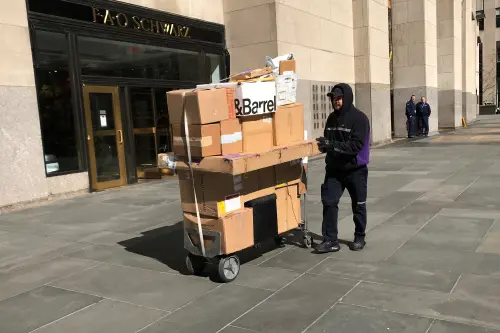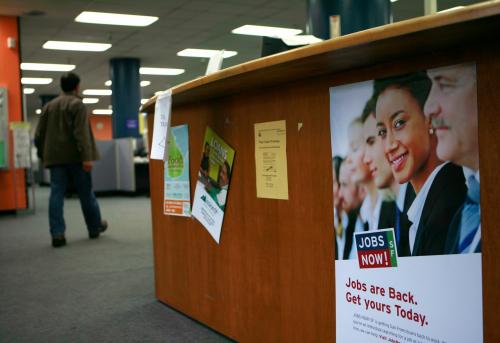The full economic impact of the COVID-19 pandemic came into sharp relief this week, as unemployment claims and small business closures both skyrocketed.
Addressing the fallout will require a massive federal stimulus, and both Congress and the White House have proposed aid packages exceeding $1 trillion. But as we noted on Monday, immediate assistance to workers and small businesses will initially be supplied by local and regional coalitions of governments, nonprofits, larger businesses, and philanthropies.
To be clear, no individual city or state has the resources to fully address the economic and public health crisis we’re facing. But this week we are seeing how these recovery coalitions are providing direct assistance and access to state and national resources on two key priorities: protecting workers and families and saving small businesses.
Help for workers and families
Between March 8 and March 14, unemployment claims spiked nationwide by 71,000, a larger one-week increase than at any point during the Great Recession. This week, unemployment claims will be orders of magnitude worse, and will disproportionately include low-wage workers that were already economically insecure.
Federal policymakers want to send direct payments to Americans in need. In the meantime, dozens of communities have launched worker relief funds to support incomes as jobs are lost and workers’ hours decline (see this helpful Good Jobs Institute roundup). Whether housed at the local community foundation (as in Baltimore and San Diego), United Way office (in Birmingham, Ala., Detroit, and Indianapolis), or city government (Boston), worker relief funds use philanthropic and/or public funds to ensure households have their basic food, shelter, and utility needs met.
Considering that many workers are losing their jobs as businesses close and lay off staff, most large cities are approving moratoriums on evictions, including Washington, D.C., Atlanta, and Detroit. Some places, such as Los Angeles, are only halting evictions for people affected by the loss or reduction of work hours because of the pandemic. Wayne County, Mich. (where Detroit is located) is preventing foreclosures on all homes for the rest of 2020.
The city of Atlanta is rolling out one of the heftiest relief packages. The $7 million assistance fund will provide emergency assistance for children’s and seniors’ food programs, homelessness responses, the purchase of telework technology, assistance to employees and hourly wage earners for businesses engaged with the city, and support to small businesses.
Eventually, though, local dollars will be exhausted. This is why it is critical for local intermediaries to serve as connectors to state and national resources.
Several local governments have been liaisons in connecting their constituents to these resources. The city of Seattle, for example, is using their website’s COVID-19 page to connect workers in need of support to the state’s unemployment benefits, paid family and medical leave, and other state financial resources. St. Louis is doing the same to share guidance on accessing state resources to file for unemployment and workers’ compensation, as well as addressing racial discrimination.
Local organizations can also connect businesses to state policies that can support workers. As my colleague Annelies Goger has pointed out, 26 states have policies that compensate employers who undertake “work-sharing,” a practice where businesses reduce hours instead of laying people off. Workers get to keep their employment status and benefits but are compensated for lost hours by unemployment insurance. Historically, companies that pursue work-sharing are quite satisfied with it, but the program is not well-known nor well-utilized. Every intermediary in a state with a work-share policy should be touting this program.
Saving small businesses
The scale of the small business challenge during this crisis is daunting. Earlier this week, the Small Business Administration announced it would be extending disaster relief loans to small businesses, but only after their states meet the federal designation. Undoubtedly, more federal small business relief will be needed, and several groups have proposed their own slate of policy ideas.
In the interim, community-based small business responses are occurring at two levels: direct relief and information provision. First, more and more cities are launching small business relief funds. On Thursday, San Diego Mayor Kevin Faulconer announced a partnership with local financial institutions to provide zero-interest microloans for affected businesses through a $4 million revolving loan fund. Meanwhile, the city of Philadelphia and the Philadelphia Industrial Development Corporation have proposed a plan to help businesses maintain payroll obligations and preserve jobs by providing a mix of new grants and zero-interest loans for Philadelphia businesses that make under $5 million in annual revenue.
To give businesses some wiggle room and allow them to get back on their feet after losing income from closures, many cities are deferring business taxes. San Diego has implemented a program to delay payments of business tax certificates and associated fees. Washington, D.C. is allowing businesses to defer February and March sales taxes to July 20, 2020. San Francisco’s Small Business Relief Program is providing a deferral of business taxes and licensing fees.
Restaurants and airport businesses are particularly struggling right now, and there are some cities specifically addressing those needs. Detroit has created a temporary program called the Restaurant Carryout Zone to provide restaurants with an on-street pickup area for customers, so that they can continue selling meals. Atlanta’s mayor just signed a relief bill specifically for employees of airport businesses. The bill lets Atlanta temporarily suspend the businesses’ rental payments for four months so they can use that money to provide relief to employees who are experiencing lower hours and lost wages.
At a second level, the nation’s network of economic development organizations, chambers of commerce, and local governments can be critical connectors and information distributors between local businesses and state and federal resources.
Florida is currently asking business owners to fill out a Business Damage Assessment Survey. According to the city of Tampa’s website, the survey will “allow Governor DeSantis to request that the federal government declare Hillsborough County [Tampa’s county] a federal disaster area, which will open-up additional sources of business funding through the Small Business Administration, FEMA and federal agencies.”
The Indy Chamber in Indianapolis is providing application coaching for businesses that are applying for SBA disaster loans. In addition, they are giving small businesses the opportunity to receive quick, small emergency business loans. All this information is captured at the chamber’s Rapid Response Hub.
What comes next?
Local leaders are now looking to Washington for action. This week, the White House and Congress are both drafting economic stimulus packages. The U.S. Treasury has proposed a $1 trillion relief package that would include sending checks to individual Americans ($500 billion), supporting key industries ($200 billion), and small business loans ($300 billion). Congress is contemplating similar measures.
Mayors, nonprofits, and other civic institutions are fighting the early stages of the crisis with the tools, information, and resources they have at their disposal. But the true economic impact of the coronavirus is only beginning to unfold; our cities and states urgently need Washington to send more resources to the front.
The Brookings Institution is committed to quality, independence, and impact.
We are supported by a diverse array of funders. In line with our values and policies, each Brookings publication represents the sole views of its author(s).








Commentary
Cities and states are on the front lines of the economic battle against COVID-19
March 20, 2020